Yagwang, a visual art collective formed by
Kim Terri and Jeon In—both born in the 1990s—reveals the language of
representation that subverts fixed notions of identity through various media
such as video, sculpture, performance, and painting. As the name Yagwang
(meaning "phosphorescence") suggests, the two artists have continued
to illuminate and give voice to those considered strange or alien—like
phosphorescent objects that momentarily glow in the dark after absorbing light.
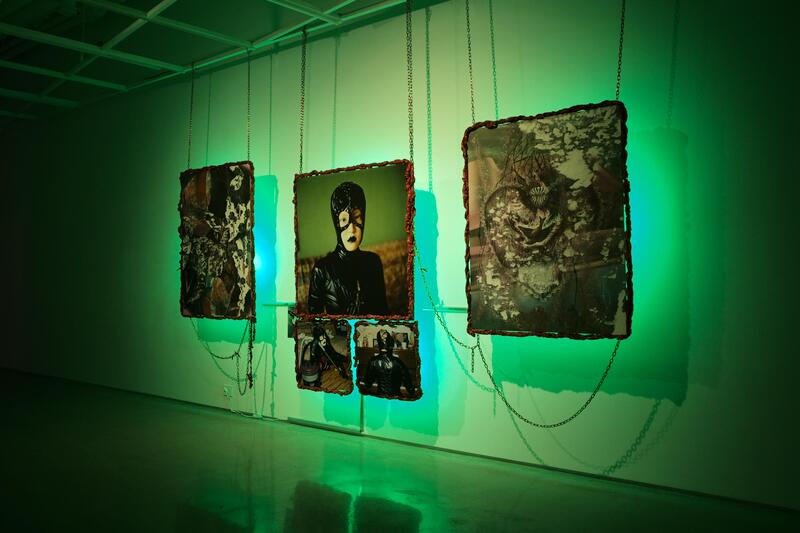
Installation view of 《Lubricant》 (Windmill, 2022) ©Windmill
Yagwang was formed in 2021 with the
performance work Lubricant. In their first solo exhibition
of the same name, 《Lubricant》
(Windmill, 2022), Yagwang presented works that responded to the discordant
timelines of contemporary life by radically exploring sexuality and challenging
fixed visual and conceptual frameworks of gender.
The exhibition 《Lubricant》 focused on queer—particularly lesbian—sexuality. In the show,
Yagwang engaged visual elements repeatedly appearing in the subcultures shared
by their generation of queer (lesbian) individuals, integrating them into
fictional narratives. They developed interviews and video works that revealed
these identities, along with a simultaneous broadcast performance that brought
all of these elements together.
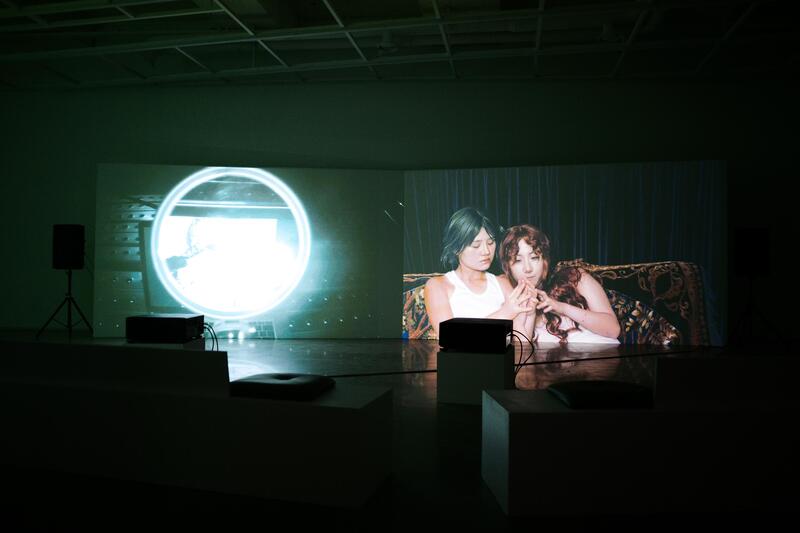
Installation view of 《Lubricant》 (Windmill, 2022) ©Windmill
A recurring subject in this body of work is
the Russian female duo band t.A.T.u.. The group rose to global fame in the
early 2000s with their lesbian concept, gaining immense popularity beyond
Russia. However, t.A.T.u. eventually disbanded after members Lena and Yulia
revealed the violent and exploitative nature of the concept’s orchestration.
Despite this, t.A.T.u. continues to maintain a devoted cult following, with
numerous fan accounts still active on social media.

Installation view of 《Lubricant》 (Windmill, 2022) ©Windmill
Yagwang poses the question of how the
shared memory of t.A.T.u., formed regardless of the surrounding controversies
and truth disputes, resonates with queer individuals born in the 1990s. Based
on responses to this question, they created a fake interview video titled
Lantern.
The video features twelve individuals
performing stereotypical lesbian characters. Wearing exaggerated makeup, each
offers conflicting answers to a single question. Lantern
uses t.A.T.u. as a medium to reveal that no one can fully grasp the pace or
trajectory of another person’s life.
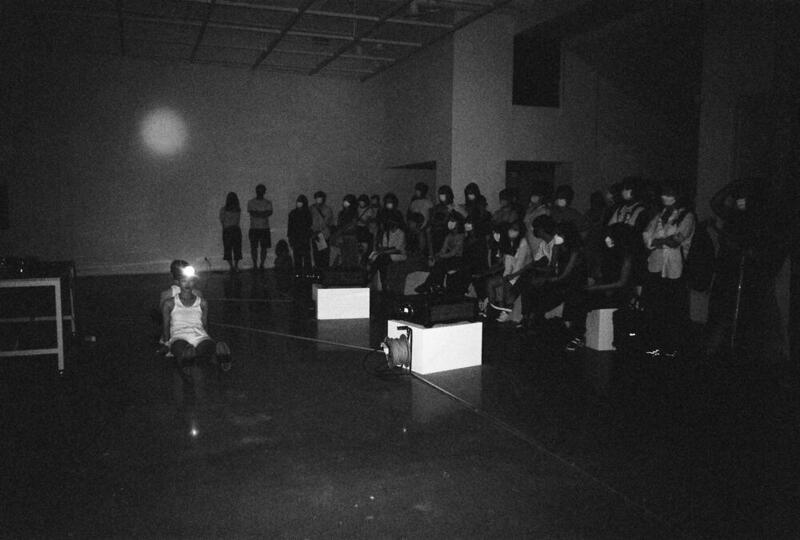
Installation view of 《Lubricant》 (Windmill, 2022) ©Windmill
Alongside the interview video,
LATE(X)—a video work based on the artists’ real-life
experiences working in clubs—was screened. Within the exhibition space, these
two works were brought together in a live dual-channel performance titled
Lick my heart. The performance transformed the venue into
something resembling a lesbian nightclub. Beginning with a DJ set, over ten
performers in diverse costumes and makeup roamed the exhibition space, each
embodying their own lesbian-coded personas.
Meanwhile, a broadcast performance modeled
on a conventional TV talk show setup staged a space where untold stories about
lesbian life and love—rarely addressed in mainstream media—could finally be
voiced.
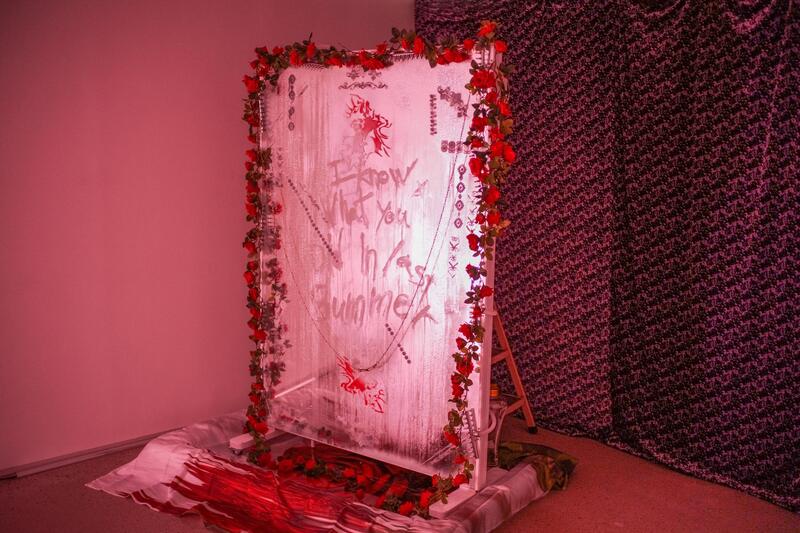
Installation view of 《Lubricant》 (Windmill, 2022) ©Windmill
As stated in the exhibition
preface—"We hope this exhibition allows queers, especially lesbians, to
empathize with one another, to affirm each other’s presence, to experience joy
through the shame that arises from empathy and recognition, and to share visual
satisfaction"—Yagwang’s work creates a space where the often-invisible
lives and sexualities of lesbians within the queer spectrum are illuminated and
mutually affirmed.
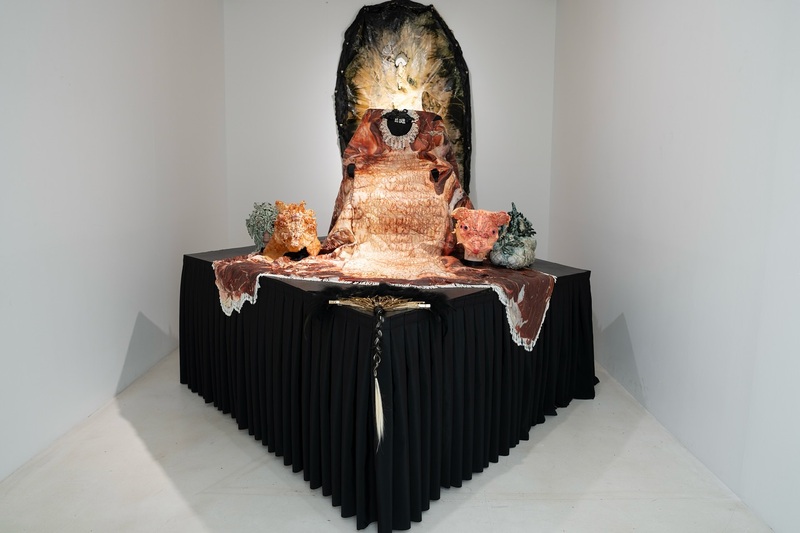
Installation view of 《KIND》 (PS Center, 2024) ©PS Center
In their recent works, Yagwang has
constructed fictional narratives featuring characters that metaphorically
embody those who fall outside normative categories, often evoking B-movie
aesthetics and installations made from latex, a signature material in their
practice.
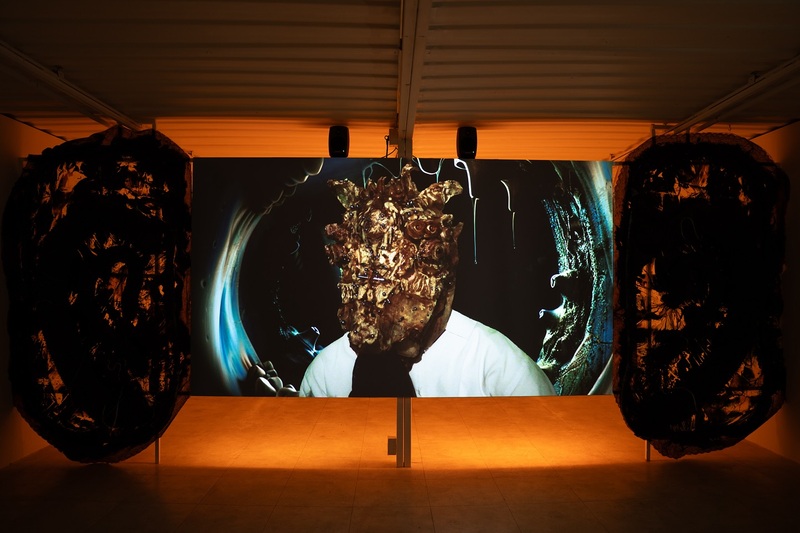
Installation view of 《KIND》 (PS Center, 2024) ©PS Center
For example, in their second solo
exhibition 《KIND》, held at PS
Center in 2024, Yagwang attempted to expand the fictional narrative into real
time and space by installing props and set pieces from the video work directly
in the exhibition space.
The exhibition consisted of the video work
Intruder, a recreated installation of its setting, and a
simultaneous live performance. The performance, titled Raw
Proof, unfolded as “raw proof” of the “intruder” from the video.
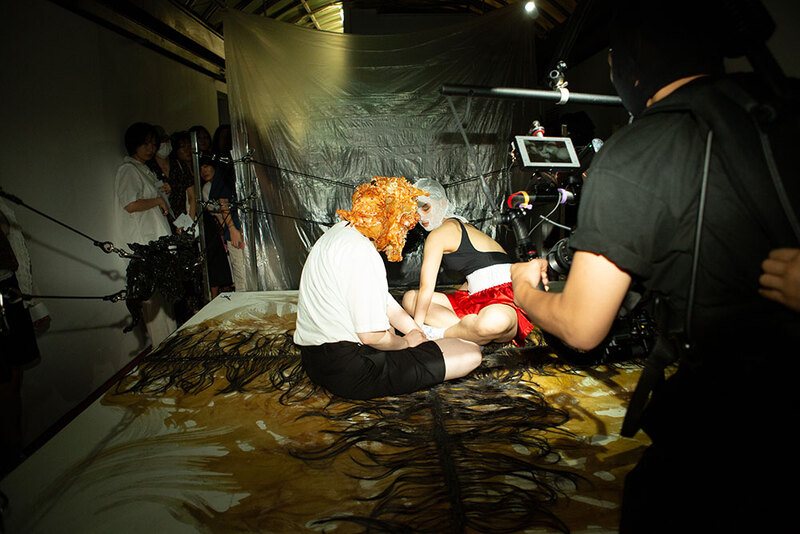
Yagwang, Raw Proof, 2024, Performance ©Yagwang
The performance began with performers
wearing masks resembling mammals with the texture of insect exoskeletons,
entering the exhibition space in a line. One of the performers takes on the
role of a director or commentator, narrating the current situation and issuing
instructions, prompting the other performers to enact various scenes from the
video work as if they are being filmed live and simultaneously on-site.
Dressed in exaggerated costumes, the
performers climb onto a wrestling ring covered with a vinyl sheet, where they
attack one another, film the scenes, or walk around with cupping marks
resembling lumps—repeating a series of surreal actions. Wearing mutated or
alien-like shells, they generate a strange energy, transforming into intruders
who create ruptures in the fabric of real space and time.
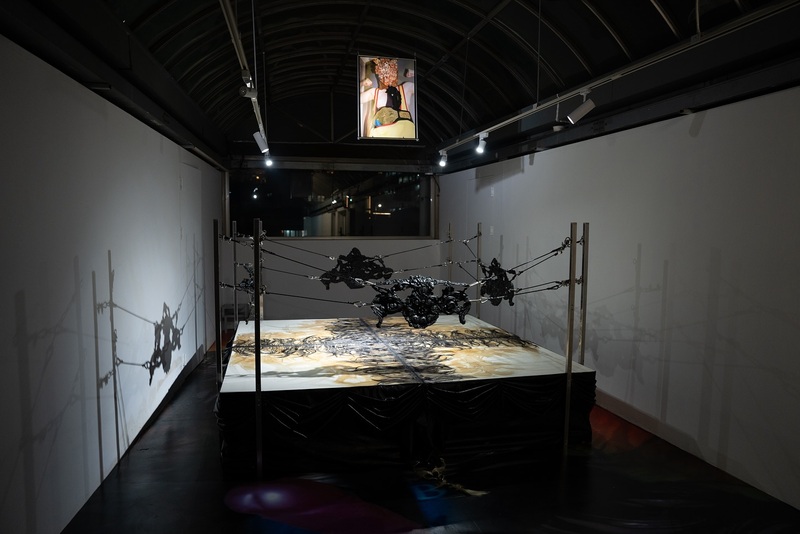
Installation view of 《KIND》 (PS Center, 2024) ©PS Center
Yagwang’s work layers multiple identities
and heterogeneous temporalities onto the everyday, where a singular and linear
space-time typically flows. By inserting alien and queer space-times into the
linear flow of daily life, Yagwang aims to “construct a new porous timeline.”
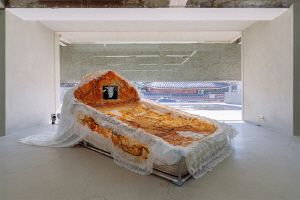
Yagwang, Visitor, 2023, Single-channel video, HD, color, sound, 5min 44sec. / Sculpture for Visitor (2023), 2025, Latex, chain, stud, lace, 143×223×150cm, Installation view of 《The Poor》 (Museumhead, 2025) ©Museumhead
Furthermore, Yagwang presented work where
the symbols of sexual identity and class identity are intriguingly intertwined
in the group exhibition 《The Poor》 held at Museumhead in 2025.
Among these works, the sculpture
Sculpture for Visitor (2023), which utilizes the material
properties of latex, was first shown at the exhibition 《Motel Exhibition》 held for only 12 hours on
October 27, 2023, in a rented motel near Hongdae. This work encapsulates the
exhibition’s context, which evoked the spatial characteristics of motels—such
as sex work, temporary shelter, and low-cost rest—and was newly restaged in the
Museumhead space.
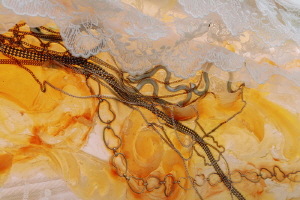 Yagwang,
Sculpture for Visitor (2023) (detail), 2025, Latex, chain,
stud, lace, 143×223×150cm, Installation view of 《The Poor》 (Museumhead, 2025) ©Museumhead
Yagwang,
Sculpture for Visitor (2023) (detail), 2025, Latex, chain,
stud, lace, 143×223×150cm, Installation view of 《The Poor》 (Museumhead, 2025) ©MuseumheadThis work is characterized by latex
sculptures that wrap around the bed frame. Due to the nature of the material,
it emits an ammonia odor and bears traces of gradual corrosion. Hidden within
the heavily burdened and ornate sculpture are images collected and cast from
various places. Over time, the images gradually distort as the latex surface
corrodes.
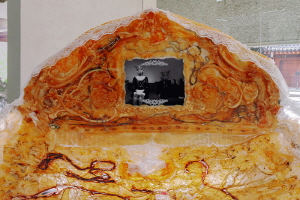
Yagwang, Visitor, 2023, Single-channel video, HD, color, sound, 5min 44sec., Installation view of 《The Poor》 (Museumhead, 2025) ©Museumhead
Meanwhile, a looping video work, Visitor
(2023), plays at the head of the bed. In this short black-and-white film, a
mutant rat—surviving after consuming a tenant’s rat poison—threatens to
overtake the home. The rat’s resistance to being trapped symbolizes a
trespassing and occupying body. Its form evokes queer physicality, marked by
bodily and genital deformities resulting from drug use. These elements confirm
the work’s exploration of intersecting identities.
In the video (and other performances),
Yagwang places a woman dressed in a maid costume at the center. Beyond the
sexualized roleplay of the costume, what stands out is the shadow of
reproductive labor—the cleaning of tables and floors in clubs, homes, exhibition
spaces, and beyond.
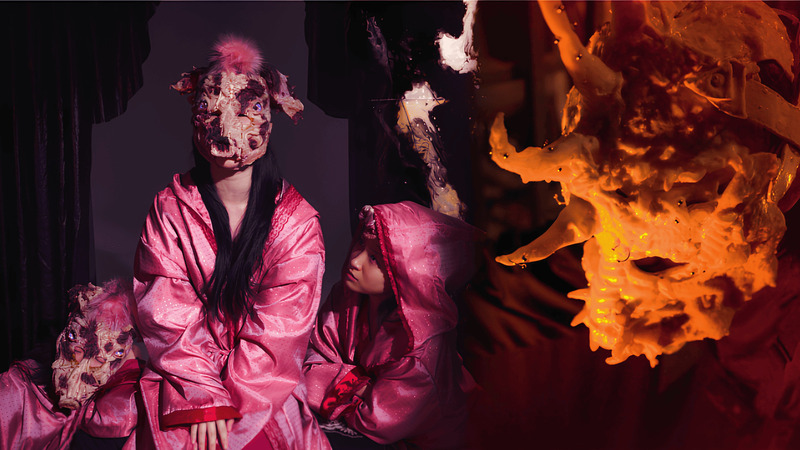 Yagwang,
Dark Ride, 2025, Single-channel video, color, sound, 19min. ©Yagwang
Yagwang,
Dark Ride, 2025, Single-channel video, color, sound, 19min. ©YagwangYagwang, who participated in the National
Museum of Modern and Contemporary Art (MMCA)’s 《Young
Korean Artists 2025: Here and Now》, expressed everyday
stories connected to fear through the new work Dark Ride
(2025), rather than objectifying the sensation of fear itself. Set against the
backdrop of a horror experience space like the “Haunted House” in the Wolmido
theme park, this video unfolds from the perspective of a worker providing the
fear experience.
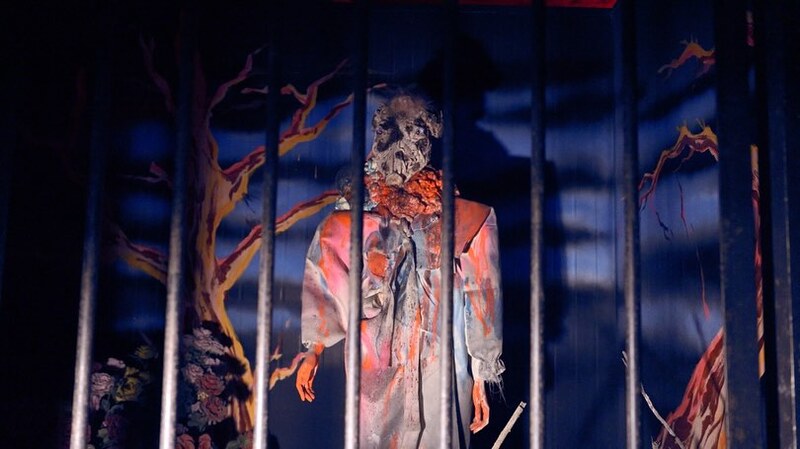 Yagwang,
Dark Ride, 2025, Single-channel video, color, sound, 19min. ©Yagwang
Yagwang,
Dark Ride, 2025, Single-channel video, color, sound, 19min. ©YagwangYagwang created the video by focusing on
theme park workers to reveal how fear has become a highly objectified
sensation—and, conversely, what kinds of stories can emerge from those who have
been objectified. The video is accompanied by installation works that extend
into the exhibition space. Through this, the video suggests that the conditions
of real-life fear are embedded not only in the route of the dark ride itself
but also in the everyday lives of theme park employees.
Through these worker-characters, the video
also weaves together complex discourses on gender, labor, and care in
contemporary society.
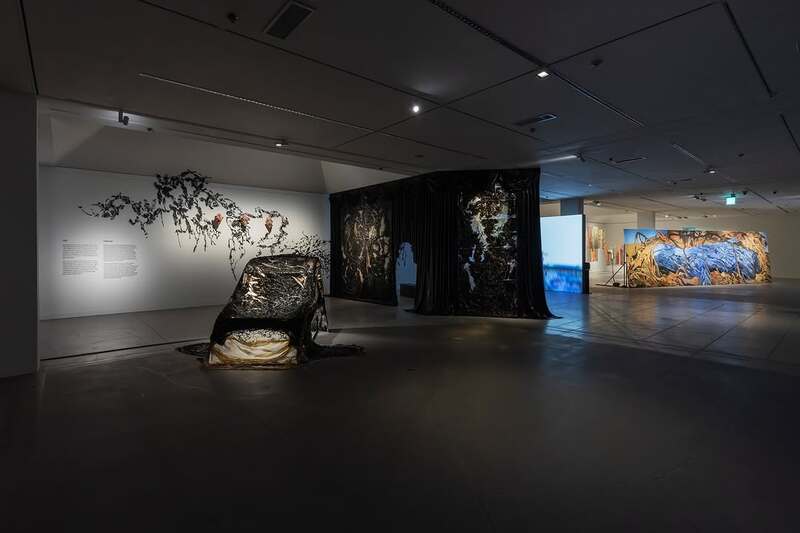 Installation view
of 《Young Korean Artists 2025: Here and Now》 (MMCA,
2025) ©MMCA
Installation view
of 《Young Korean Artists 2025: Here and Now》 (MMCA,
2025) ©MMCAIn this way, Yagwang has presented works
that offer an intersectional perspective on gender through discourses on human
rights, generations, and labor, mediated by the body and space. Through art as
a common yet temporary experience, these works create diverse and heterogenous
timelines within the realities that operate according to “normativity,”
visualizing how disparate energies collide and connect.
Yagwang’s practice is both an artistic
experiment and practice to embrace the diverse identities and energies of
numerous queer existences that fall outside the norms defined by society.
“In a world full of contempt for all those
who fall below any standard set by the society we live in, isn’t ‘queerness’
ultimately a word that can embrace all of this?” (Yagwang, from an artist interview in the MMCA 《Young Korean Artists 2025: Here
and Now》)
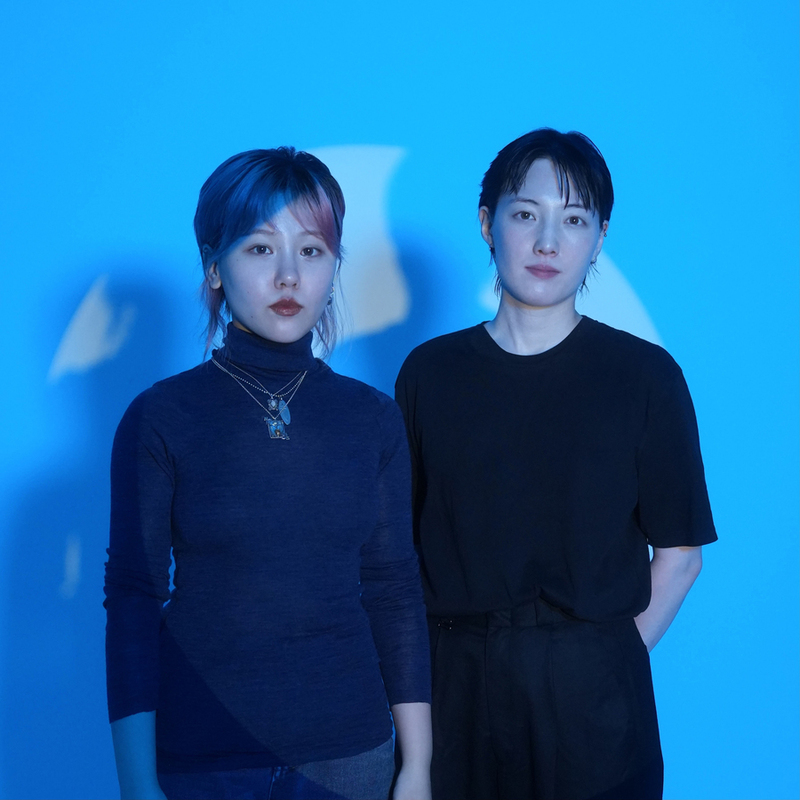
Artist duo Yagwang ©MMCA
Formed in 2021, Yagwang is a visual arts
collective consisting of Kim Terri (b. 1993) and Jeon In (b. 1995). Their solo
exhibitions include 《KIND》 (PS
Center, Seoul, 2024) and 《Lubricant》 (Windmill, Seoul, 2022).
They have also participated in various
group exhibitions, including 《Minibus, Oort Cloud,
Fluttering Pages》 (ARKO Art Center, Seoul, 2025), 《Young Korean Artists 2025: Here and Now》 (MMCA,
Gwacheon, 2025), 《The Poor》 (Museumhead,
Seoul, 2025), 2024 ARKO × OnCurating International collaborative exhibition 《Into the Rhythm: From Score to Contact Zone》 (ARKO Art Center, Seoul, 2024), and 《Motel
Exhibition》 (Misungjang Motel, Seoul, 2023).
References
- 국립현대미술관, 작가인터뷰 | 야광 | 젊은 모색 2025: 지금, 여기 (National Musuem of Modern and Contemporary Art, Korea (MMCA), ARTIST INTERVIEW | Yagwang | Young Korean Artists 2025: Here and Now)
- 윈드밀, [서문] 윤활유 (Windmill, [Preface] Lubricant)
- 하루에 하나, 흡수한 빛을 뿜어낼 때 증폭되는 레즈비언의 기쁨
- 서울문화재단, 김세연 - 방문자, 침입자, 목격자. 야광 개인전 《카인드 : Kind》 퍼포먼스 <날것의 증거(Raw Proof)>
- 뮤지엄헤드, [서문] 가난한 자들 (Museumhead, [Preface] The Poor)
- 국립현대미술관, [리플렛] 젊은 모색 2025: 지금, 여기 (National Musuem of Modern and Contemporary Art, Korea (MMCA), [Refleat] Young Korean Artists 2025: Here and Now)




























